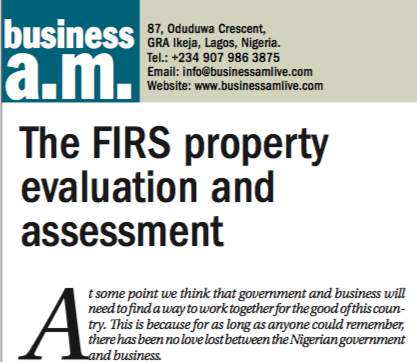The FIRS property evaluation and assessment
February 13, 20181.3K views0 comments
At some point we think that government and business will need to nd a way to work together for the good of this country. is is because for as long as anyone could remember, there has been no love lost between the Nigerian government and business.
Government after government, the story has remained the same that those who are at the helm of governance either misunderstand business or deliberately choose to misunderstand business. We think that this position is borne out of the fact that politicians think and believe strongly that politics trumps every other thing because it places them in the position of power and nothing else matters.
But this is far from the truth. Politics are for winning elections. Governance is the act of delivering on promises made during campaigns. And delivering on campaign promises is largely a function of political economy management, which necessarily involves creating an enabling environment for business to thrive so that they can create the jobs that politicians promise during campaigns.
For indeed, the truth is that politicians do not create jobs anywhere in the world as government jobs are not the real job creating opportunities real politicians talk about when they talk about jobs. Politicians enable business to create jobs by making it possible for a business to operate by not been obnoxious through their policies and actions that could site the space for growth and wealth creation that business is better placed to help politicians deliver.
While we agree that Nigeria has suffered from a hangover on its now diminished oil wealth a the d government is doing everything possible to correct the mistakes of the past, we are of the view that it is not carrying business along. is attitude is historical and it is a behaviour which is not appropriate for correcting past errors.
Policies must be tested on a cost-bene t basis and they must o er serious consideration if, against the backdrop of positive intention, they are found to be the wrong antidote for the infractions they are purposed.
e Federal Inland Revenue Service (FIRS) is trying very hard to pack many life times of failings by Nigerian governments into a capsule of time as if it is launching a rocket into space. In this drive to raise additional revenues for the country, it appears to have entered an area that is now causing serious discomfort to business and for which we think that there is need for an urgent review.
The FIRS has introduced a property valuation and assessment programme, which business, represented by the Organised Private Sector, is up in arms against. It would seem to us that the FIRS in its search for places to eke out revenues has not considered it necessary to consult with business about this new programme.
The OPS says the exercise involves revaluation and reassessing of properties in which its members do business for the purpose of imposing new taxes on them. It says this poses a threat to the continued existence of many of them. ey claim this represents double taxation and they even claim it is an illegal act because it is not backed by law as the part of the law the FIRS says it is relying on no longer exists; it has been deleted.
The tax man is feared all over the world. He is not feared insane environment because it does not take the law into its hands. It is feared only when you fall foul of the law. This must not be different in this country.
The OPS makes a lot of sense in their argument for which the FIRS should consider. ey say, for instance that:
· Section 30 of the Companies Income Tax Act from where the FIRS purportedly derived its power for the exercise is no longer in force, pursuant to its deletion by section 12 of Companies Income Tax (Amendment) Act 2007.
· There already exists a plethora of property valuation-based taxes in Nigeria. e Land Use Charge payable in Lagos State, which is being replicated across the country, is based on property valuation. the governor’s consent fees payable on alienation of interest in property across the country is based on property valuation. Capital Gains Tax payable on disposal of property is somehow influenced by property valuation. Rent payable on lease of real estate property is subject to withholding tax deduction.
· The properties of its member companies were also subjected to valuation pursuant to the provisions of the Companies and Allied Matters Act (CAMA) Cap C20 Laws of the Federation for the purposes of companies’ annual accounts leading to payment of tax on their pro ts.
We align with these arguments and think that there is still a whole lot of confusion around the kind of federal system that we operate, where there seems to be eagerness to over duplicate punishments in the name of chasing taxes.
